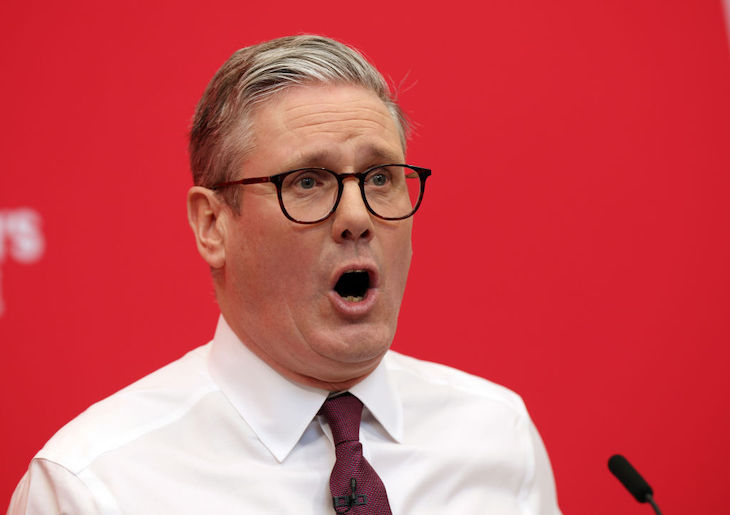Academic conferences – even ones about politics – rarely make the news. This week’s annual conference of UK political scientists at the University of Strathclyde in Glasgow talked about many interesting topics, including the link between football and populism in Southern Europe and the role that comedy plays in the formation of Scottish identity. But such presentations rarely trouble the Twittersphere, let alone the front page of the newspapers.
Labour are on average 19 points ahead of the Conservatives
In my own case, I was talking about whether the next UK general election will be dominated by voters’ views on what political scientists call ‘valence’ issues, that is, things like the economy and the NHS where there is largely consensus on what we would like to happen (that is, more growth and shorter waiting lists). If that were to be the case, that would represent a striking contrast with the last election in 2019, when voters’ attitudes towards a ‘position’ issue, that is, Brexit (where people disagreed on whether they wanted to be inside or outside the EU) largely determined how people voted. Again, all very academic stuff.
But, thanks to Twitter, the days when what is said at an academic conference remains in the conference are over. In responding to a question from the audience, I remarked that it seemed ‘99 per cent likely’ that Labour would form the next government. No sooner was it said than somebody decided to exercise their thumbs and put the remark on Twitter. Soon my phone was ringing with excited calls from journalists, many of whom are now preoccupied with any electoral straw that might seemingly be blowing in the wind, seeking confirmation that the story was true.
It was. Not that it meant I was saying, as some thought, that Labour were almost inevitably bound to win the next election. Rather I was also pointing out that, even if Sir Keir Starmer fails to win an overall majority, he is far more likely than Rishi Sunak to be able to form a government. In short, the Conservatives not only have an electoral mountain to climb between now and polling day but are also potentially at a significant disadvantage in the politics of a hung parliament.
However, first back to the polls. At present, Labour are on average 19 points ahead of the Conservatives. There is some variation around that figure – More in Common put the lead at 15 points, whereas both Savanta and Techne UK reckon it is currently 21 points. But all the polls are currently pointing towards an overall Labour majority. It could well, though, still be another eight months until polling day, if, as seems likely, the Prime Minister opts for an autumn poll. Although the average Labour lead has consistently stood at 17-19 points since June of last year (when the Conservatives’ lost ground because of their failure to fall behind the Privileges Committee finding that Boris Johnson had misled the Commons over ‘partygate’), perhaps an improving economy and flights to Rwanda will occasion something for a Conservative revival.
However, history only offers limited reason for hope. This parliament now seems set to go almost to the end of its full five-year term. In previous such parliaments during the last thirty years, the biggest turnaround in the polls in the last eight months was a six-point drop in the Conservatives’ lead over Labour prior to the 2010 general election. Even if Rishi Sunak were to match this success by Gordon Brown, that would still leave him 13 points behind. Sir Keir Starmer might well still have an overall majority.
However, perhaps we should not take the polls at face value. Some pollsters are worried about the number of 2019 Conservative voters who fail to say who they will back this time around. Others are concerned that they might be overestimating the success that Reform are enjoying at the Conservatives’ expense. Perhaps there is a risk of another polling disaster?
In 1992, the worst election for the modern polling industry, the final polls on average put Labour one point ahead. In the event the Conservatives had an eight-point lead. If an error of that size were to happen again, a 13-point Labour lead in the polls might translate into just a four-point advantage in the ballot boxes.
Given the way the electoral system is currently inclined to treat the Conservatives more favourably than Labour, that might mean not only mean a hung parliament, but that the Conservatives could well be the largest party.
However, that would unlikely result in another Conservative government. Both the Liberal Democrats and the Scottish National Party have made it clear they would prefer a minority Labour government to a Conservative one. They would likely vote down any King’s Speech that Rishi Sunak tried to present. To stay in Downing Street, Mr Sunak would need more or less to emulate Theresa May’s tally of 317 seats (nine short of a majority) – and trust that, as on that occasion, a deal with the DUP could be negotiated to take him over the line.
However, even with a favourable wind from the electoral system, reaching that position would probably require the Tories to be two points ahead of Labour in the ballot boxes. And even on our optimistic assumptions about what might happen between now and the autumn, it seems that the best for which Mr Sunak can possibly hope is to be six points adrift of that target. In short, the odds are clearly in favour of Labour forming the next government.
And what about the relative importance of valence and position issues? Well, like many an academic inquiry it all depends on how you look at it. The principal sources of Labour’s lead are, indeed ‘valence’ issues – a dire economy and a failing health service, all of which can all too easily be blamed by the opposition on one Prime Minister who crashed the economy and another who did not tell the truth.
Yet, at the same time, much of the legacy of Brexit is still with us. Despite his hopes of attracting Brexiteers, Sir Keir Starmer’s path to Downing Street looks set to be heavily strewn with the backing of many a pro-EU voter. And what is far from 99 per cent certain is how he would deal with that.
John Curtice is Professor of Politics, Strathclyde University, and Senior Research Fellow, National Centre for Social Research and ‘The UK in a Changing Europe’. He is also co-host of the ‘Trendy’ podcast






Comments